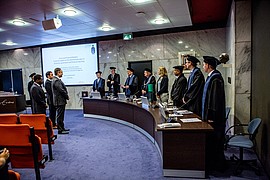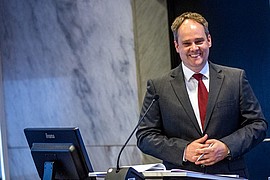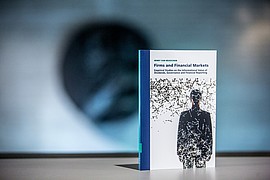PhD Defence: Henry van Beusichem

In his dissertation ‘Firms and financial markets: empirical studies on the informational value of dividends, governance and financial reporting’ ERIM’s Henry van Beusichem contributes with three empirical studies to our understanding of dividend, governance and transparency policies of Dutch listed firms.
Henry defended his dissertation in the Senate Hall at Erasmus University Rotterdam on Thursday, 16 June 2016 at 13:30. His supervisor was Prof.dr. Abe de Jong and his co-supervisor was Dr. G.K. Westerhuis. Other members of the Doctoral Committee were Prof.dr. Erik Peek (RSM), Prof.dr. P. Roosenboom (RSM), Prof. dr. Jan Luiten van Zanden (Universiteit Utrecht), Prof. dr. Rezaul Kabir,(University of Twente), and Prof. dr. Gerard Mertens (Open Universiteit).
About Henry van Beusichem

Henry van Beusichem was born in Zoelen on May 23rd, 1977. He holds a BEng degree in Industrial Engineering from the Hogeschool ‘s-Hertogenbosch (2000), an MSc degree in Business Administration from the Rotterdam School of Management, Erasmus University (2004), and a CEMS Master in International Management degree from the Community of European Management Schools (2004). He went on to work as a controller and gained professional experience at CRH Umformtechnik GmbH & Co. KG (Germany), an automotive supplier. In 2007, he joined the Department of Finance of the Rotterdam School of Management (RSM Erasmus University) as a Ph.D. candidate. His Ph.D. trajectory was supported by the Erasmus Research Institute of Management (ERIM) and by NWO, a grant applied for by prof. dr. Jan Luiten van Zanden and prof. dr. Abe de Jong. As a Ph.D. candidate, he was also involved in undergraduate and graduate thesis supervision. In 2011, he joined the University of Twente as a lecturer in Finance. His research interests are in the area of empirical corporate finance, with a particular focus on dividend policy, corporate governance and financial reporting.
Thesis Abstract

This dissertation contains three empirical studies that contribute to our understanding of dividend, governance and transparency policies of Dutch listed firms. The first study describes the dividend policy decisions of Dutch firms in the twentieth century. The fraction of dividend-paying firms has increased but the proportion of the profits which are paid out has declined steadily over the century. We identify three dividend regimes, each with a specific set of rationales. We exploit the variation across periods and apply Shapley decomposition algorithms to map changes in the dominant logic. The dominant logic of dividend policies has been revised twice and earnings have decoupled from dividend policies. In the second study, we analyse the stock price effects of block sales and purchases and the disclosures thereof for Dutch firms over the period 2000-2004. Shareholders have to disclose ownership and trading date information when passing specific ownership thresholds. We measure a significant positive price effect for block purchases but not for block sales. We do not measure a significant price effect for their disclosures. We find two opposing effects about the agency role of large shareholders. The final study describes the development of reporting transparency based on annual reports of Dutch non-financial listed firms for the periods before and after IFRS became mandatory. We analyse the relationship between corporate governance and reporting transparency and we investigate the effect of reporting transparency on future firm performance. In particular, after the introduction of IFRS, we observe a strong increase in transparency and with a much lower variation.
· View and download Henry's dissertation
Photos: Chris Gorzeman / Capital Images


